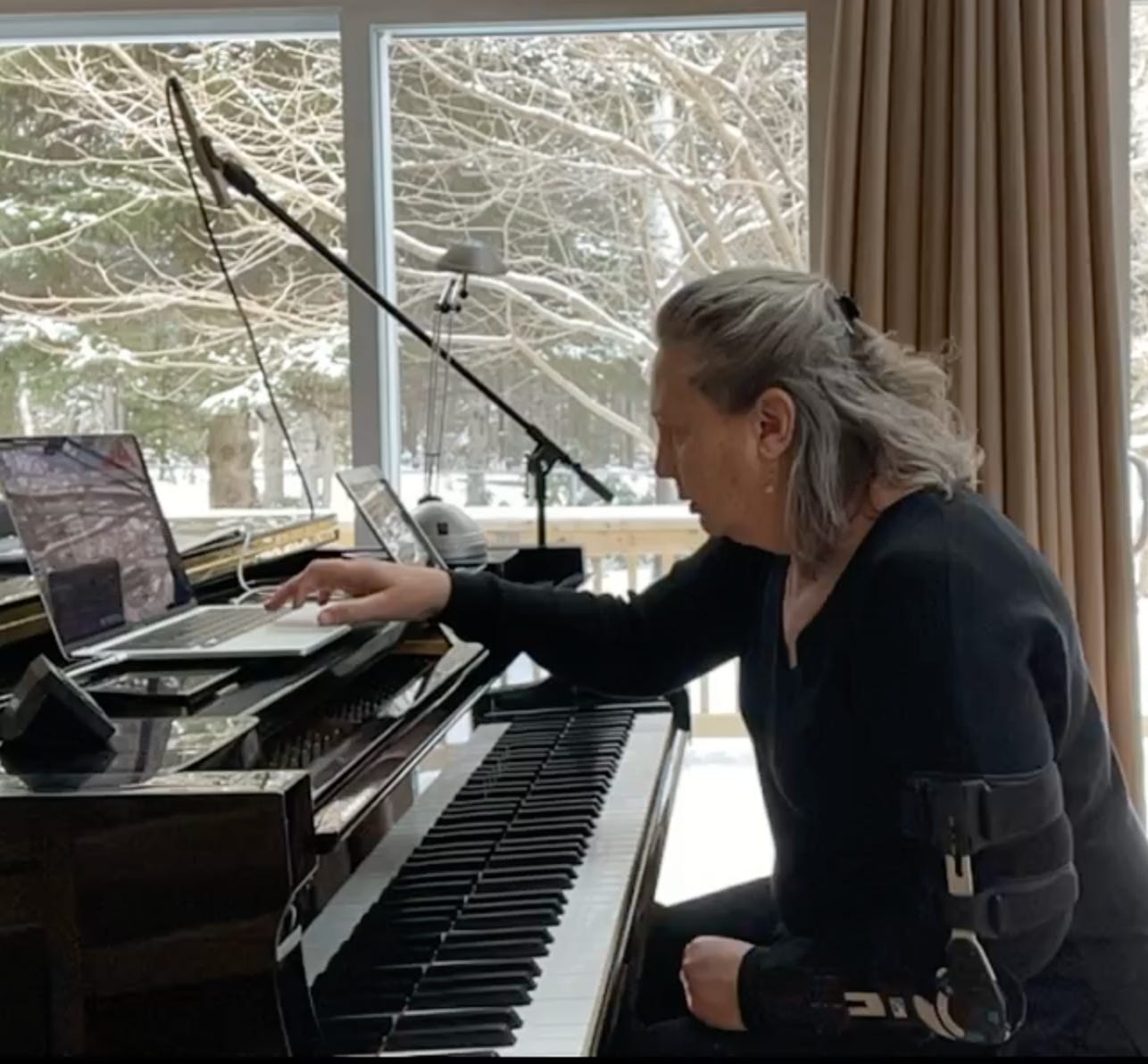Week 12: Listen to me play here!
A weekly account of one pianist's process to learn the 32 Beethoven sonatas.
It’s off to Vienna in a few days! I’ll be overjoyed to return to Beethoven’s homeland, and to celebrate his birthday there one week from today, on December 17. I will post a pic from Vienna toasting Beethoven, and you can raise a glass with me! For now, here’s a pic of gifts from my second house concert. They were happily consumed after the wrap-up of my third Beethoven program – which turned out to be a recording.
Yes, I took a different approach to my third all-Beethoven program. I was to have presented it in a house concert this weekend. As I was starting down my contact list of people who’d expressed interest in this series, I realized that the holiday season would make this date difficult for many. Perhaps, just for this concert, it would suit everyone best if, instead of hosting a gathering, I re-purposed that energy into setting up a recording modus operandi.
This idea was overdue. I need archival recordings of this process, and people off-Island would like to listen. Honestly, though, lately I have been loath to even look at a microphone.
I spent my pandemic years (years!) as an active piano professor, teaching and performing online. Self-recording, live streaming, and virtual events were my life, usually using several devices at a time. Tech hell. No doubt you can relate.
What a delight it has been to simply invite people into my living room, dim the lights, and enter a magical communal realm of music. Couldn’t I just stay with that for the rest of my life?
On the other hand, I am no Luddite. I started professionally recording for CBC at age 18, guided by my McGill professors to make the most out of a recording session, and I do love the art form.
So, I put in a call to my pandemic Guardian Angel: my former student and computer genius Liam Gordon.
“Liam! How DID we record again?! I’m drawing a complete blank on the process – I think I’ve blocked it!” After a long online tech session, we had my system running again – the one that had been designed by Liam, saving both my students and me. A noble and entirely voluntary effort, as he would take no remuneration for brilliantly guiding us through.
Later that evening, I opened some of the old 2020 files. Here are a few screenshots of my learning process with Liam during those pandemic daze. And yes, on top of everything else I had broken my arm in three places.
Okay then. I can do this thing of home-recording my Beethoven, right? It’s the best place to start, before I go further into organizing professional recording.
I knew it would take more time than one evening concert. I could not just play through the program while simultaneously recording it myself (in future, I will look for someone to assist with this during house concerts). The myriad of tech issues and preparations require a different kind of focus and plenty of extra time – time not spent on mental preparation for playing. Repertoire that’s very fresh requires heavy-duty conscious concentration, and I’ve had only four weeks to prepare and memorize four sonatas, two of which are new to me.
I’m lucky to have been trained in performing in pro studios from the start of my career, but as a result I find it impossible not to hear like a recording artist when I see a mic. I’m acutely aware of what will work in the recording. For example, the opening matters terribly. The first minute or two, statistically, is all the time a listener will give you (even this average time length is reducing rapidly with the advent of Tik Tok). Playing an opening for a live audience is far more gracious, a welcome for them to sink into the music, knowing they will stay awhile.
What I ended up doing took two sessions. The first evening, I practised with the set-up and recorded one sonata. The next day, I recorded the three other sonatas. The complete live recordings I now possess are evidence that I’ve learned and memorized the works. They’ll be useful tools later, they were excellent practice for future pro recording, but they are not to be shared now. It’s one thing to share a live evening among friends and try out ideas, and quite another to publicly share a long-lasting product like a recording. There’s a reason Angela Hewitt took sixteen years to make her Beethoven cycle recordings.
But I do want you to hear them, so I have compiled a video of clips from each movement of the four sonatas on my third concert program. These include the bright and virtuosic Opus 2 No. 3 in C major, the mercurial and moody Opus 10 No. 3, and the lovely grace and optimism of Mme. Lichtenstein’s sonata Opus 27 No. 1. The final work is the soulful and heroic Sonata Opus 81A, which portrays the young Archduke Rudolph’s departure from Vienna during the invasion of the city, his absence, and his return. Fitting music as I depart for Vienna, and we all depart from 2023.
I’ll see you on my return in 2024 for the remaining five concerts in the Beethoven Journey!





